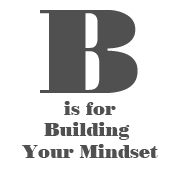B is for Building Your Mindset
Aimee C. Kimball, PhD
 Many people go through life rarely acknowledging the influence their mind has on everything they do.
Many people go through life rarely acknowledging the influence their mind has on everything they do.
Whether it's pulling yourself out of bed in the morning, focusing at work, or playing hard in matches, your mind can have a huge impact on your ultimate success. If you sat and thought about all the mental aspects of your sport, what percentage of your performance do you think is mental? Whether you think it's 1% or 99%, if you're not training your mind along with your body it is unlikely that you are performing to your potential. This article discusses ways for you to identify and recreate your ideal mindset so you can perform your best in practice, competition, and life.
So How Should I Think?
I can't tell you exactly the thoughts that should be going through your head or what your specific focus should be. Every individual has a unique mental state under which he or she performs best. Some people do well focusing on technique while the same mindset causes others to under-perform. The key is knowing what you are thinking and how you are feeling when you perform your best.
How Do I Know My Ideal Mindset?
 To identify the mindset you need to perform well, think about the best performance you ever had. Try to remember everything you can about that performance. Ask yourself:
To identify the mindset you need to perform well, think about the best performance you ever had. Try to remember everything you can about that performance. Ask yourself:
- What did I do beforehand to mentally and physically get ready (listen to music, routines, warm up)?
- Was I relaxed or pumped up?
- What did I focus on throughout the game?
- How did I react to mistakes?
- Was I confident?
- Was I having fun?
- What words describe how I was feeling?
- What words describe how I was thinking?
By building your ideal mindset, you are developing an awareness of your thoughts and feelings when you perform well, an awareness that will help you to reach your potential.
How Do I Recreate This Mindset?
First, you have to choose to create your ideal mindset. You control how you think; your mind doesn't control you. Once you realize there are no Jedi mind tricks and that ultimately you choose your mental state, you begin to take responsibility for your thoughts. Second, before each practice and game you should develop a routine that allows you to recreate this mindset. Whether you use imagery, music, or positive self- talk, develop a way to build your ideal mental and physical state.
these characteristics. This trigger should help you remember what that peak performance was like and serve as a reminder that the mindset you had then is what you want now. You can pick a simple word (Relax), a word that helps create your ideal competitive attitude (Aggressive), a physical focus cue (Follow through), or even an image of who you want to compete like (Federer). In any case, this trigger just needs to have meaning to you so that it can focus your mind in a way that is going to help you perform your best. You may also have different triggers for different situations. For example, after a mistake you might pull your socks up or tighten your ponytail to send a message to your mind to pull it together or tighten up. Essentially, this trigger would then allow you to mentally let go of the mistake and to refocus on the present moment.
Using Your Trigger
Once you have found the word that triggers thoughts and feelings related to your peak performance, you can write it on your hand, racquet, or bag so when you see it you will be reminded to think that way and to approach the game with your ideal attitude. You can you're your teammates or partner what your word is so instead of shouting Good job! Hang in there! they can shout your trigger and remind you to keep your ideal focus. Make sure you use your trigger every time you play, including practice. Much like Pavlov trained his dogs to salivate, you are using your trigger to condition the mindset you want.
Build Your Mindset
You can either go into matches hoping your mental game shows up or you can make sure it does. It starts with knowing the mindset with which you perform best. After that it's about choosing to stay in this mindset throughout the game. You can do this through pregame routines, trigger words, and by simply telling yourself, This is how I'm going to think today.
Make it Great!
Dr. Aimee C. Kimball is the Director of Mental Training at the University of Pittsburgh Medical Center's Center for Sports Medicine. She received a PhD from the University of Tennessee where she specialized in sport psychology. She is an Association of Applied Sport Psychology Certified Consultant, and is a member of the American Psychological Association, the United States Olympic Committee's Sport Psychology Registry, the USA Swimming Sports Medicine Network, and the NCAA Speakers professional, collegiate, high school, recreational, and youth athletes in a variety of sports, and assists the Pittsburgh Steelers in analyzing potential draft picks and the Pittsburgh Penguins in developing their nation and has appeared in Men's Health Magazine, Runner's World, Athletic Management Magazine, various local and national newspapers, and has appeared on ESPN, NPR, and news broadcasts across the country. Recently, Dr. Kimball was named as one of Pittsburgh Magazine' s Top 40 People Under 40 for her dedication to improving the Pittsburgh region. Currently, Dr. Kimball works with athletes, coaches, corporate leaders, and other performers to assist them in achieving success in sport and life. (412-432-3777; kimballac@upmc.edu)







